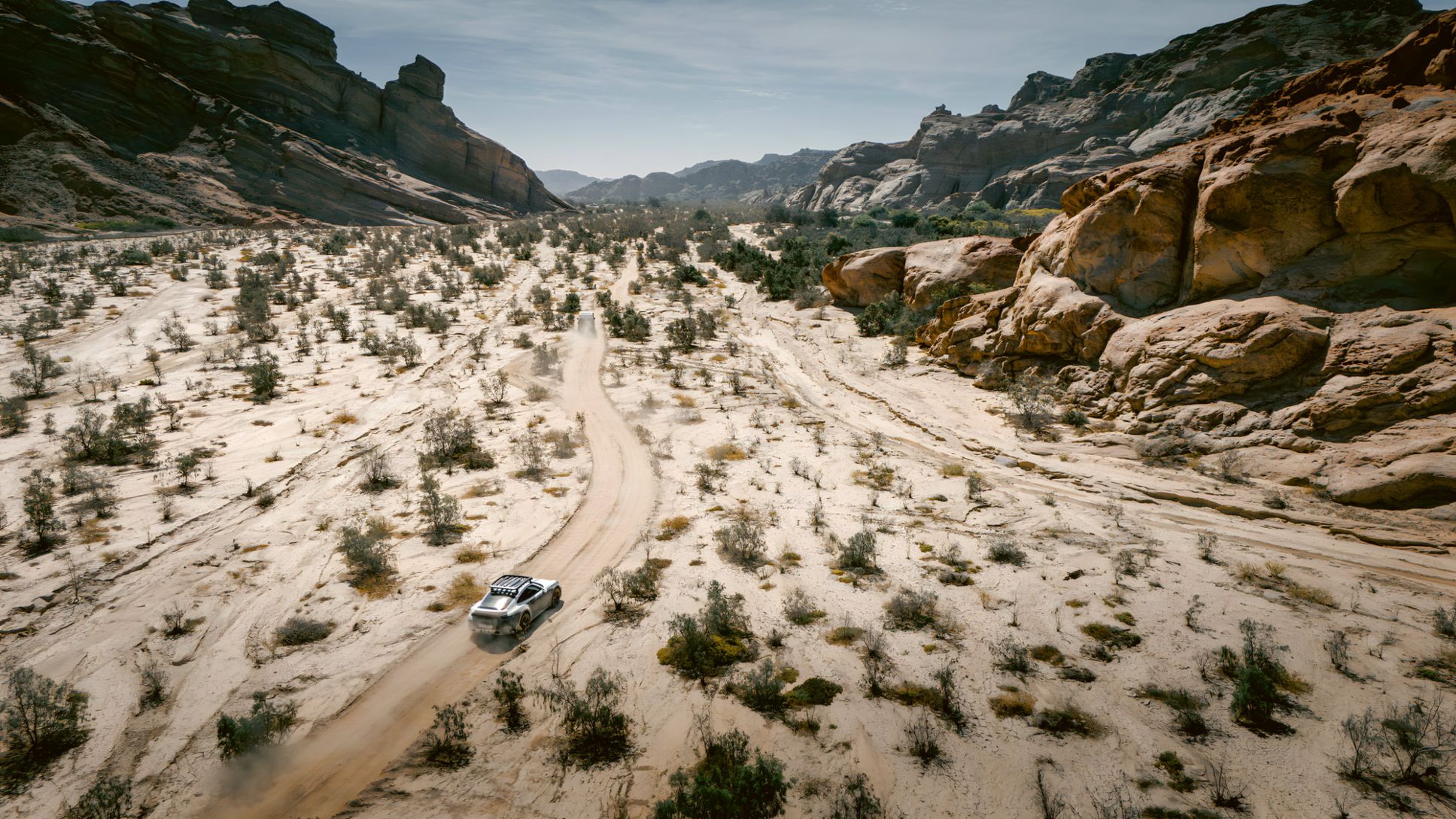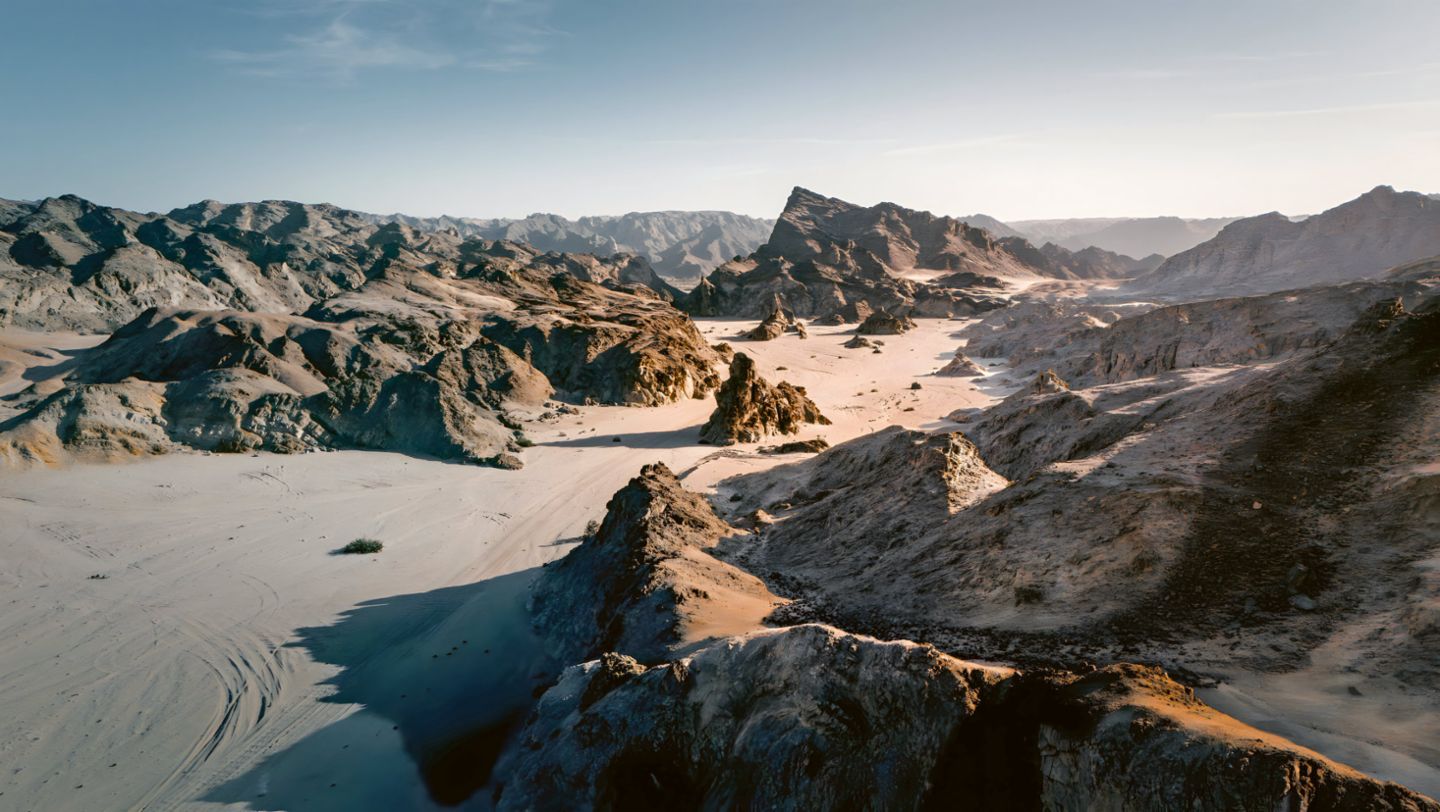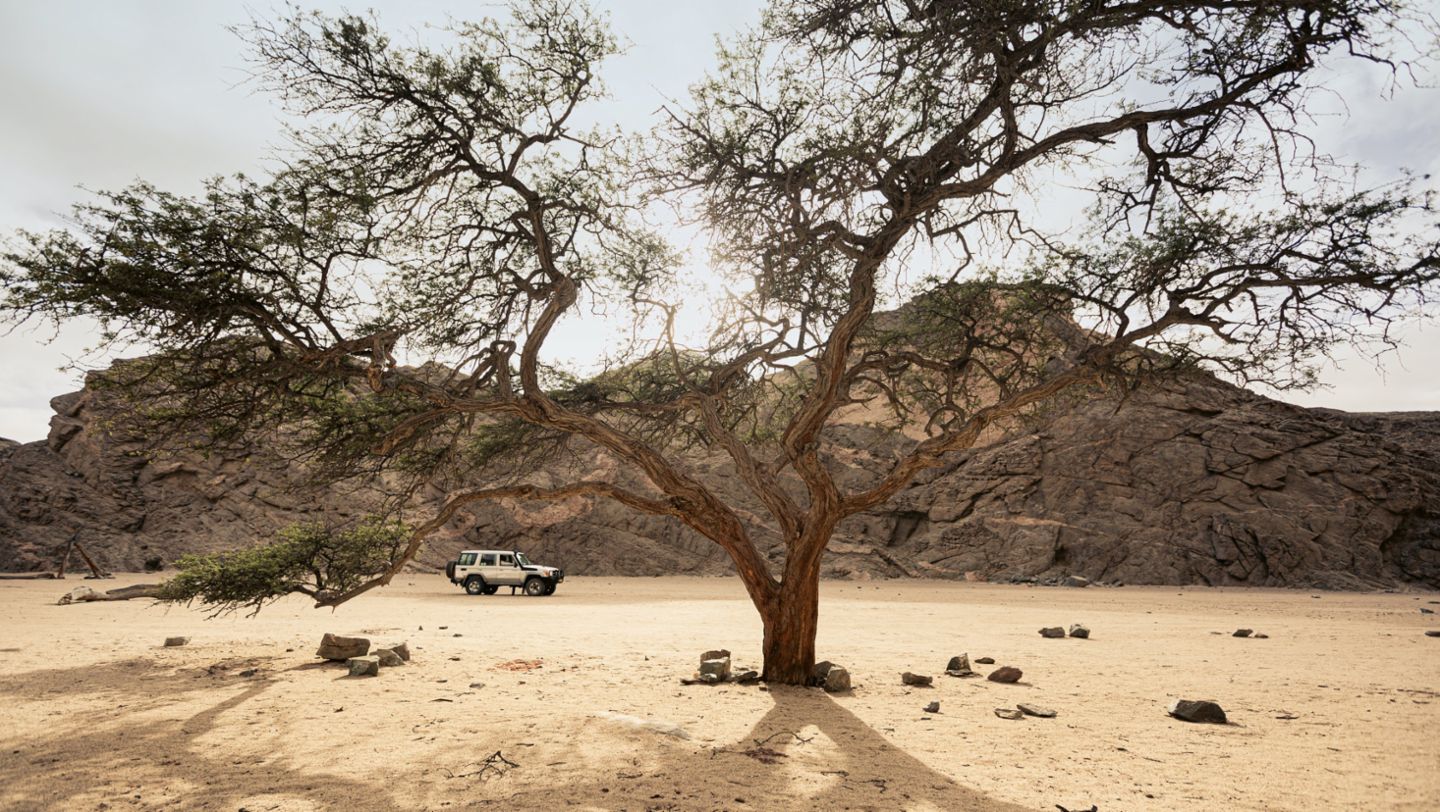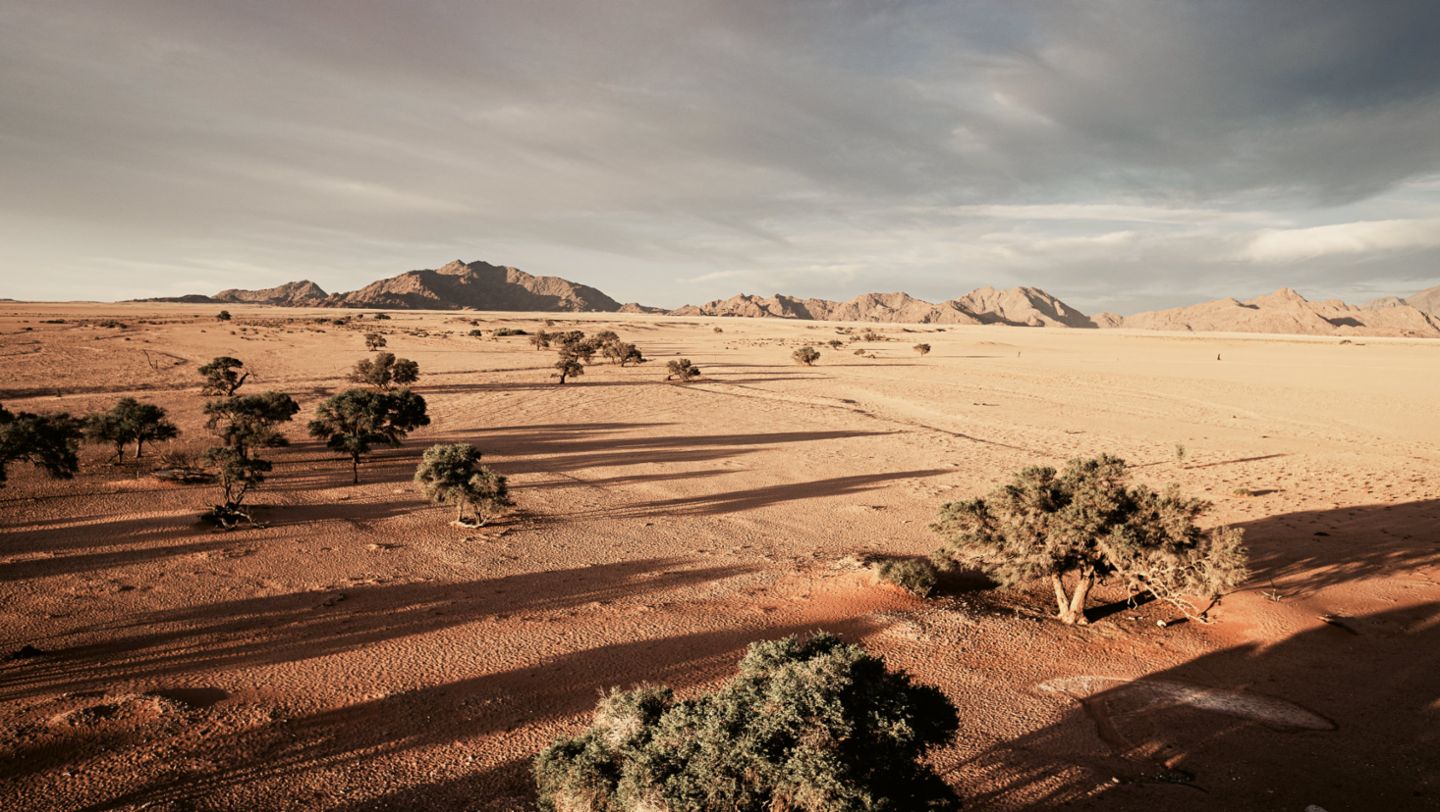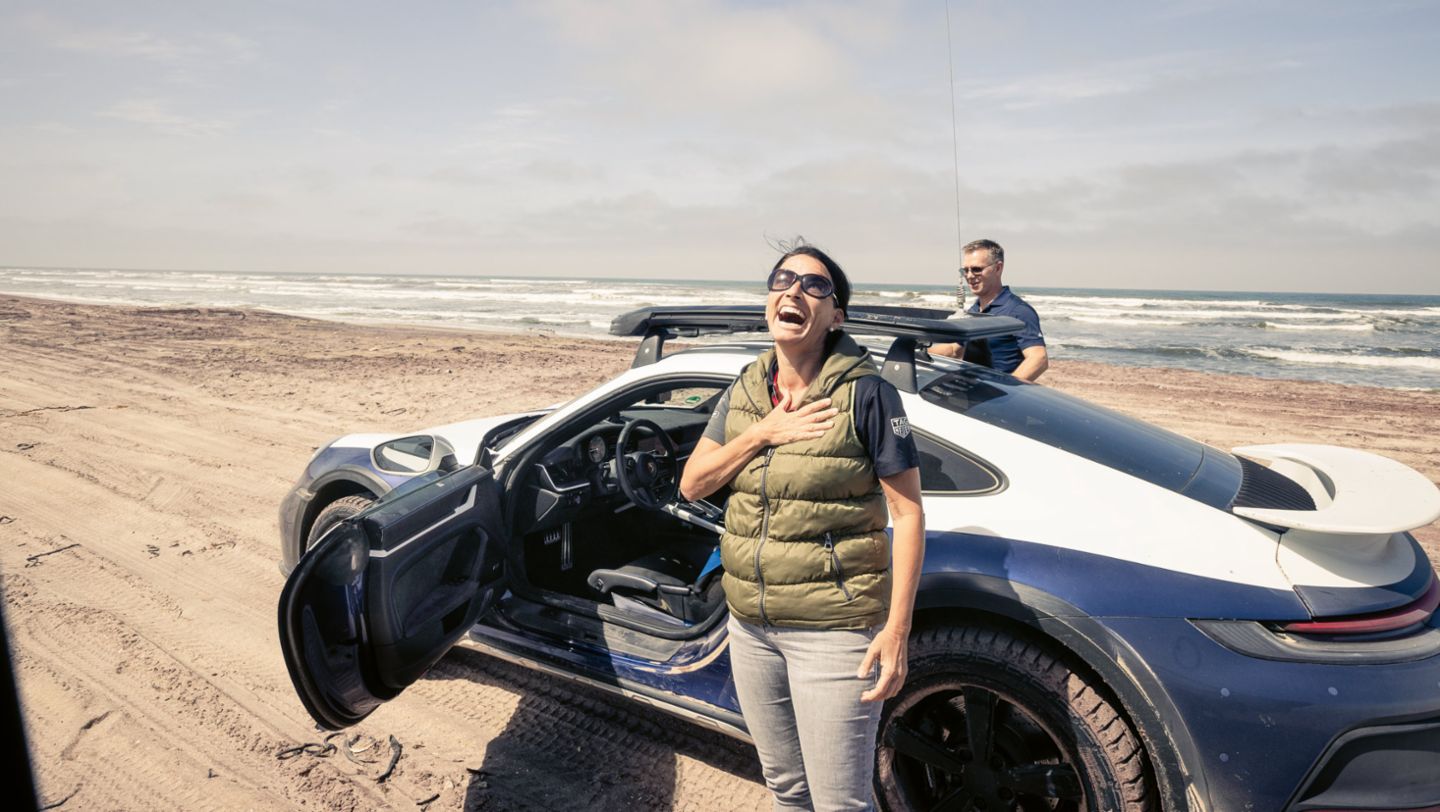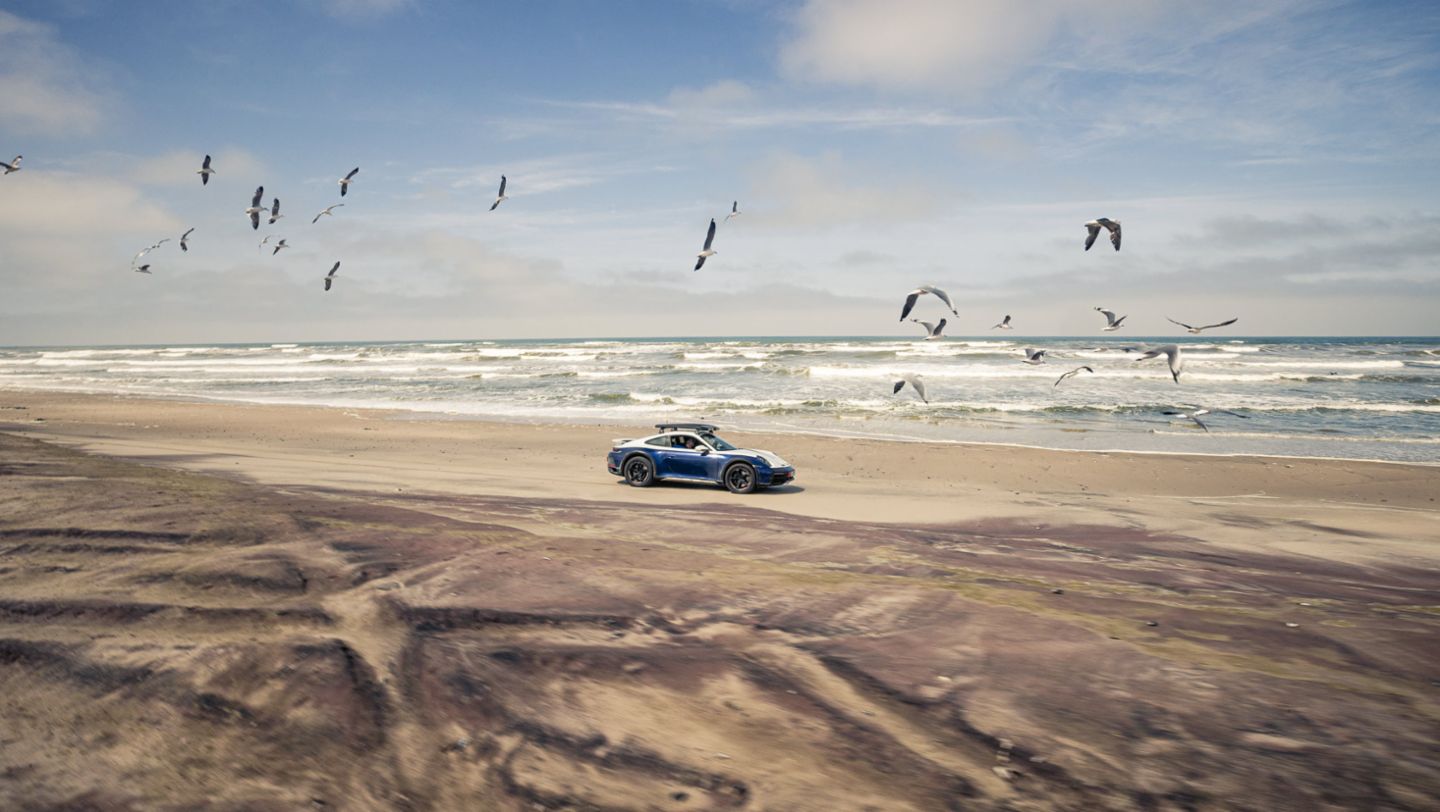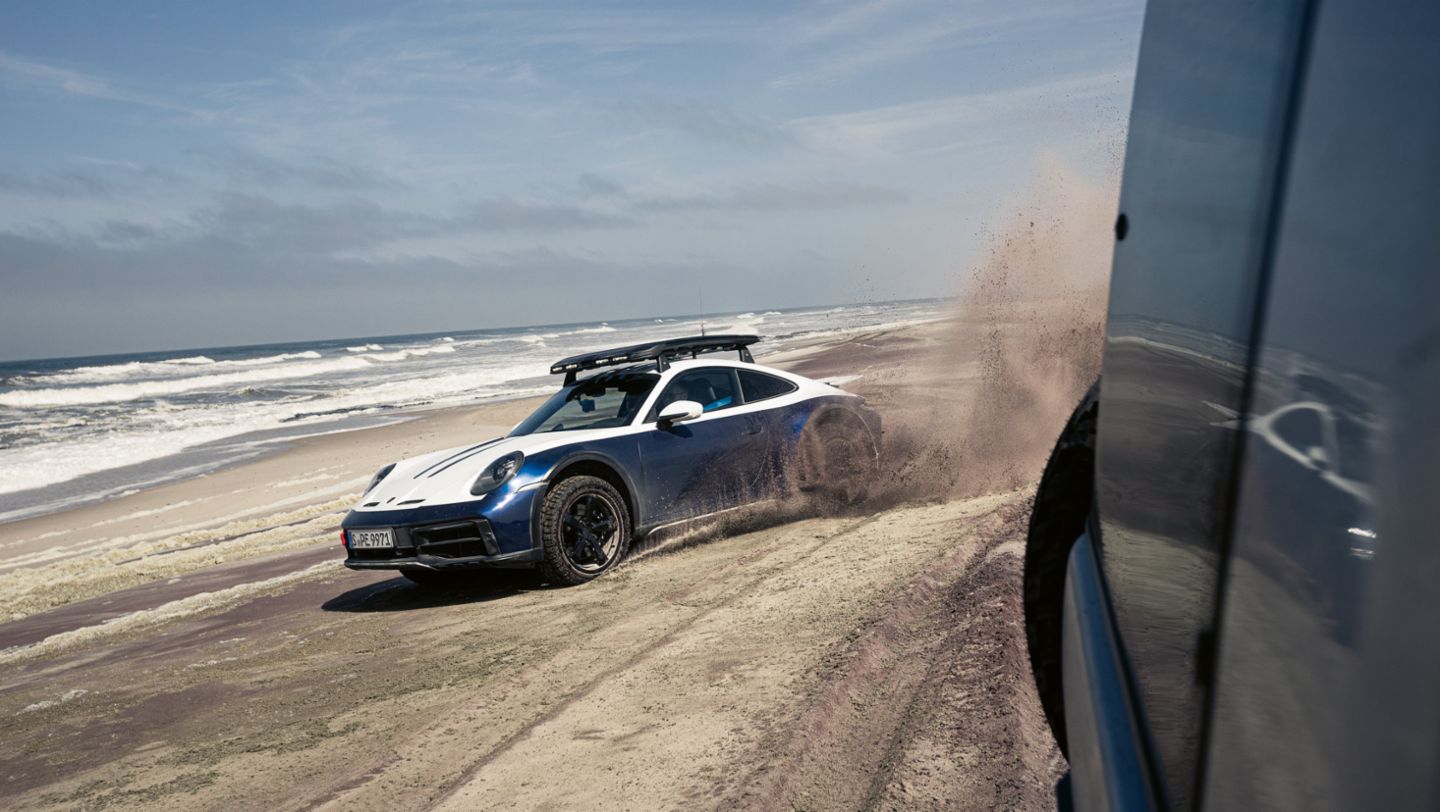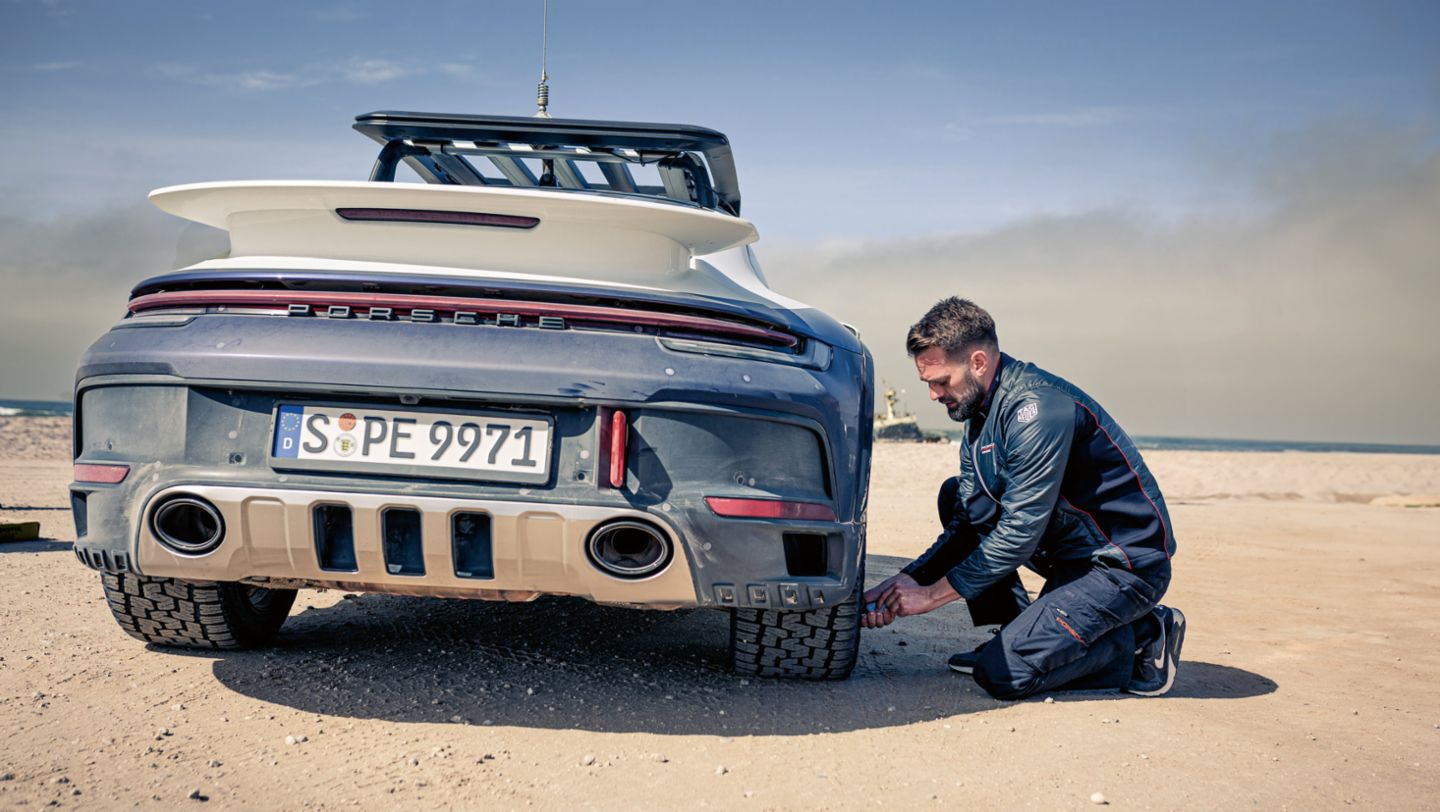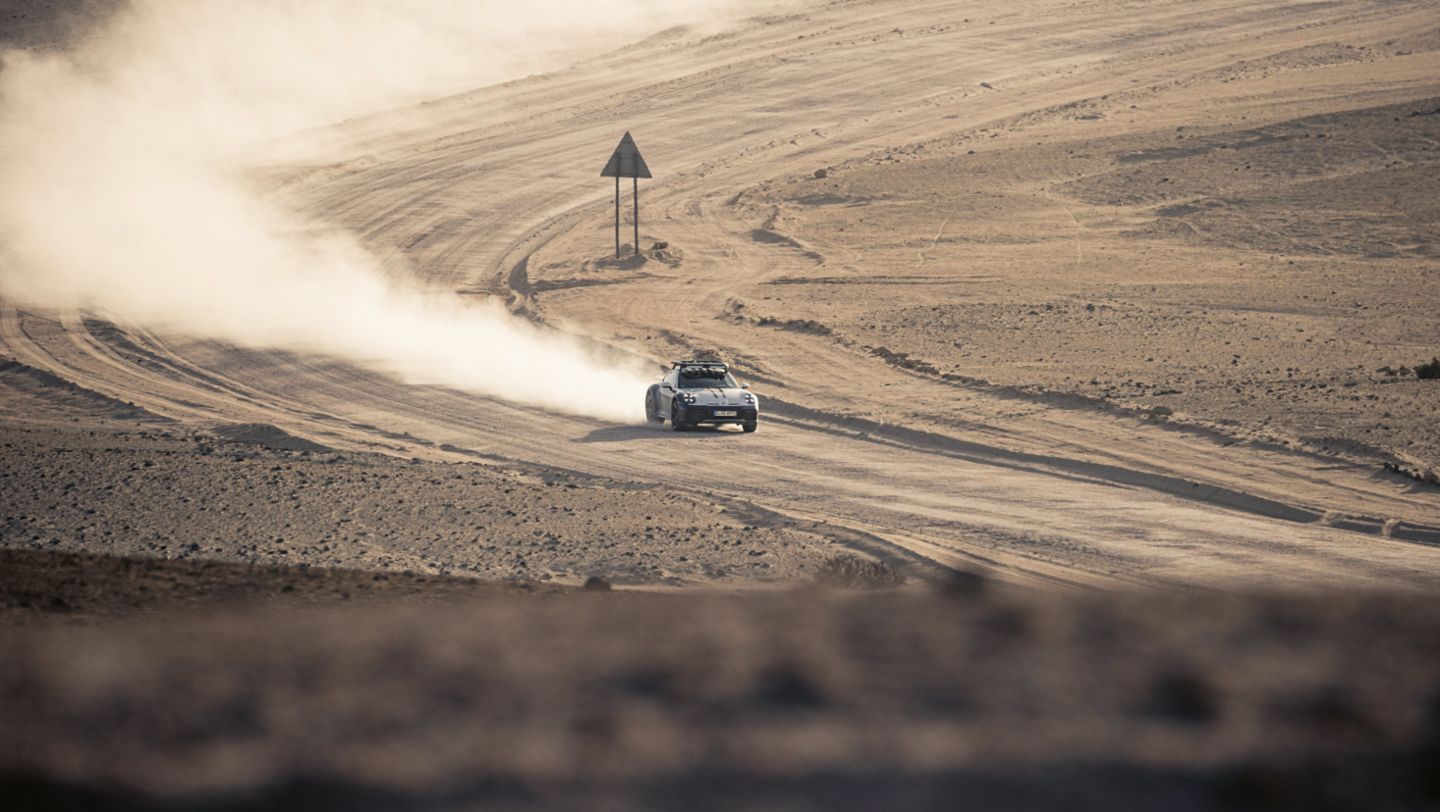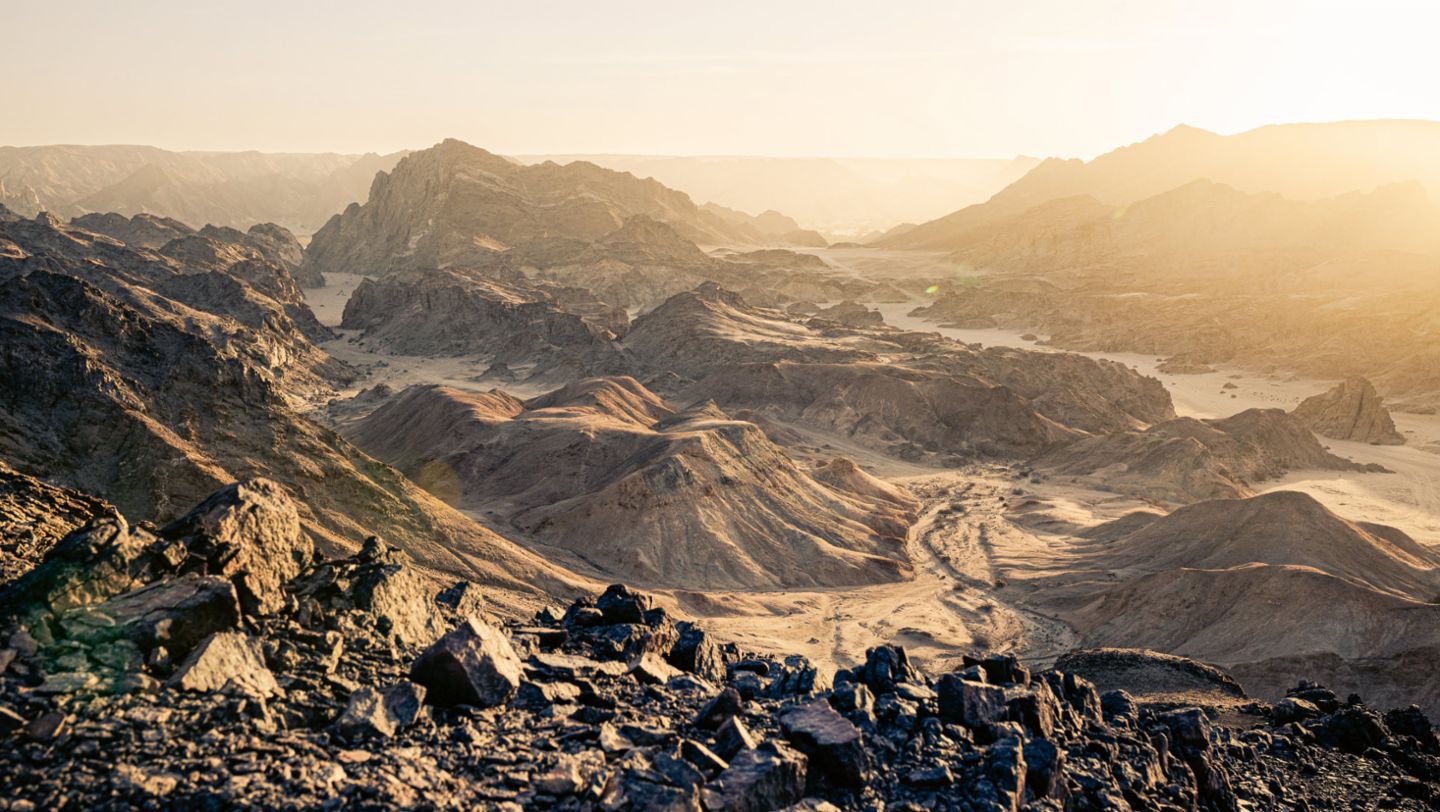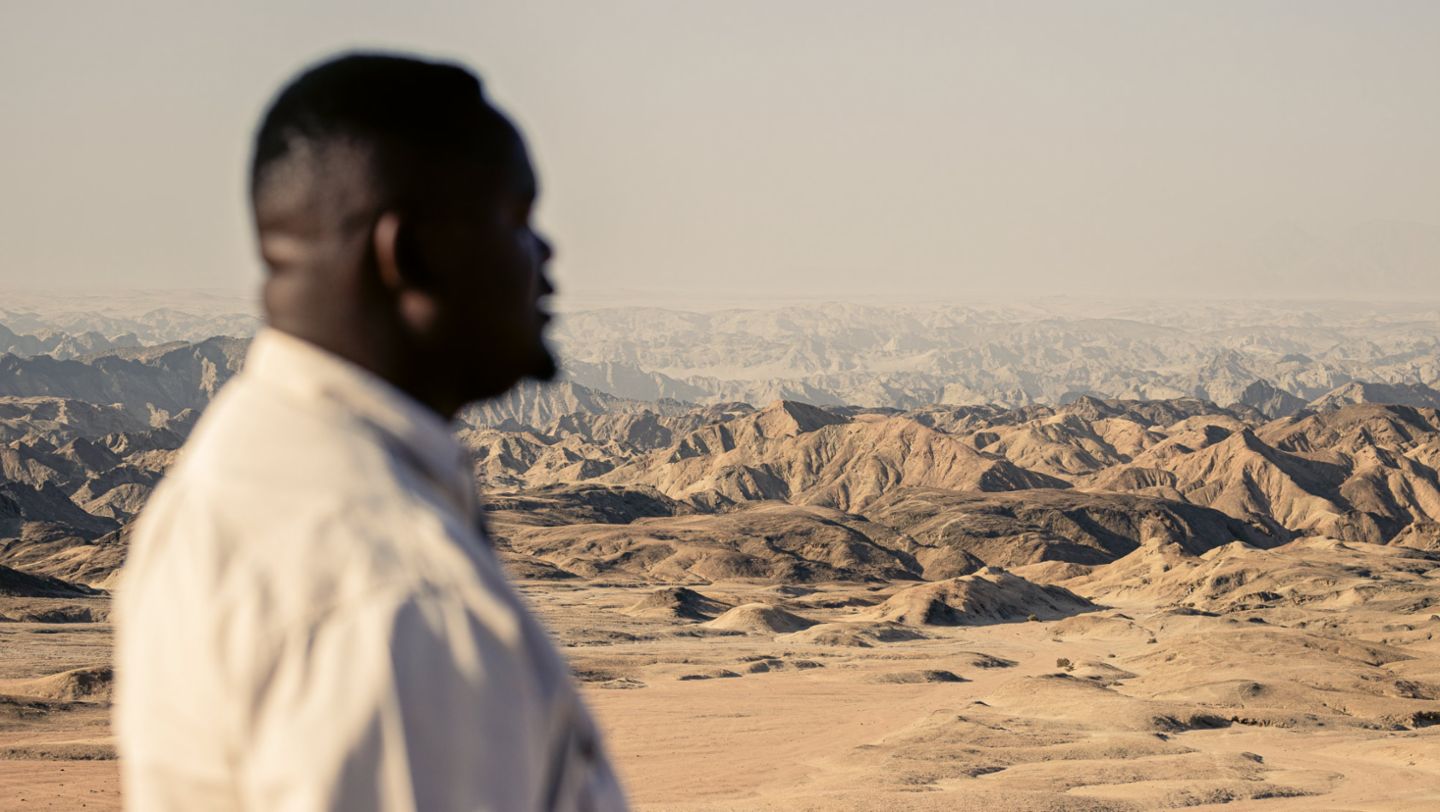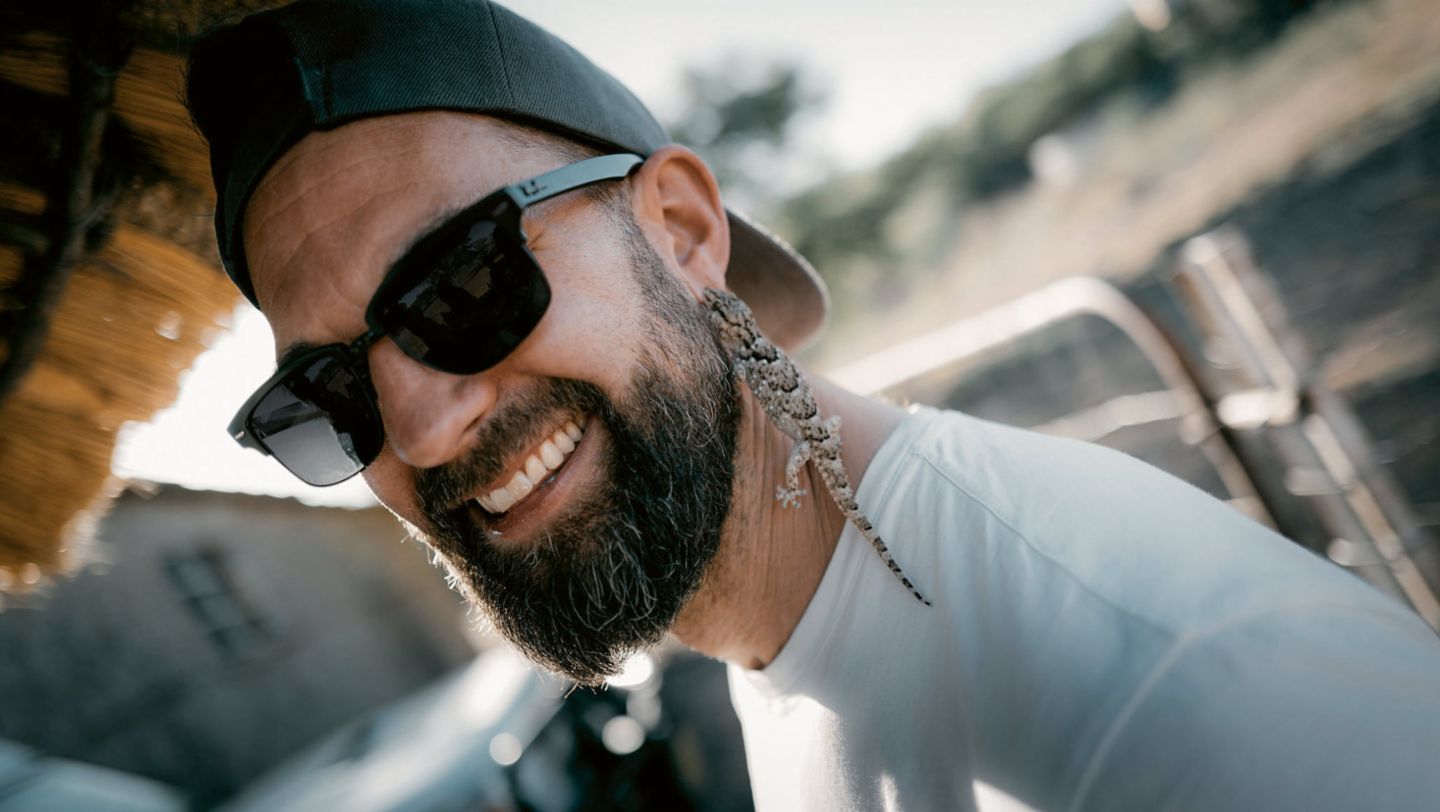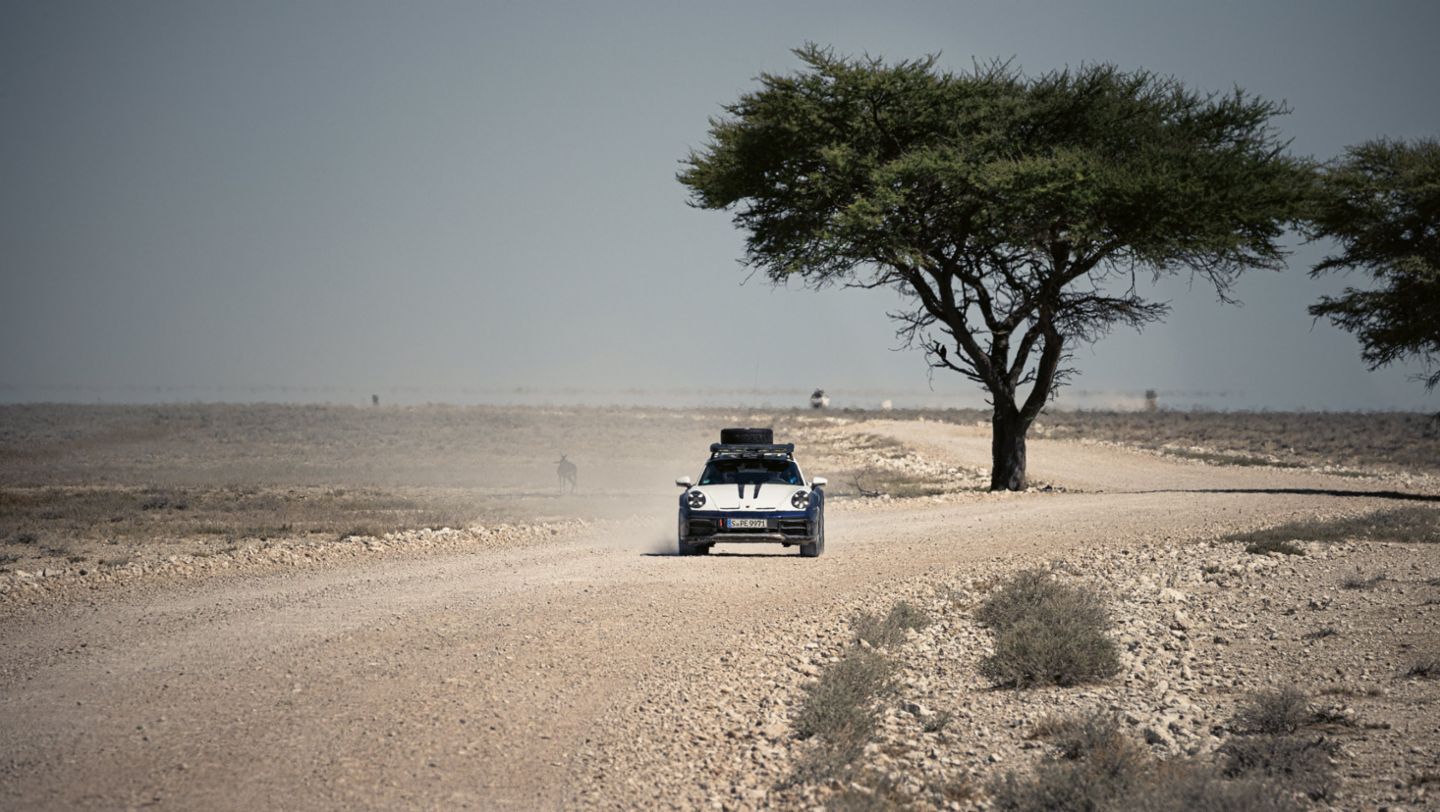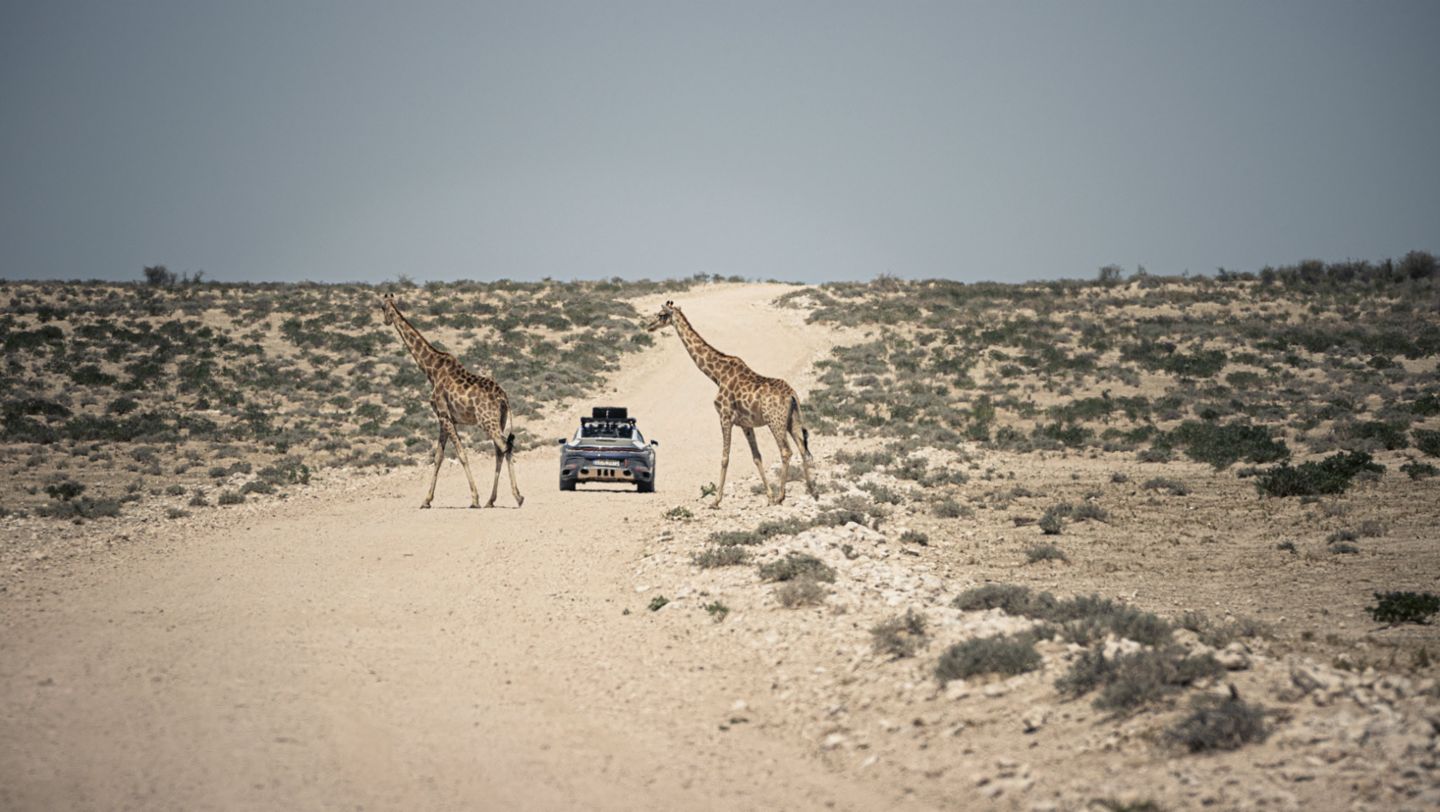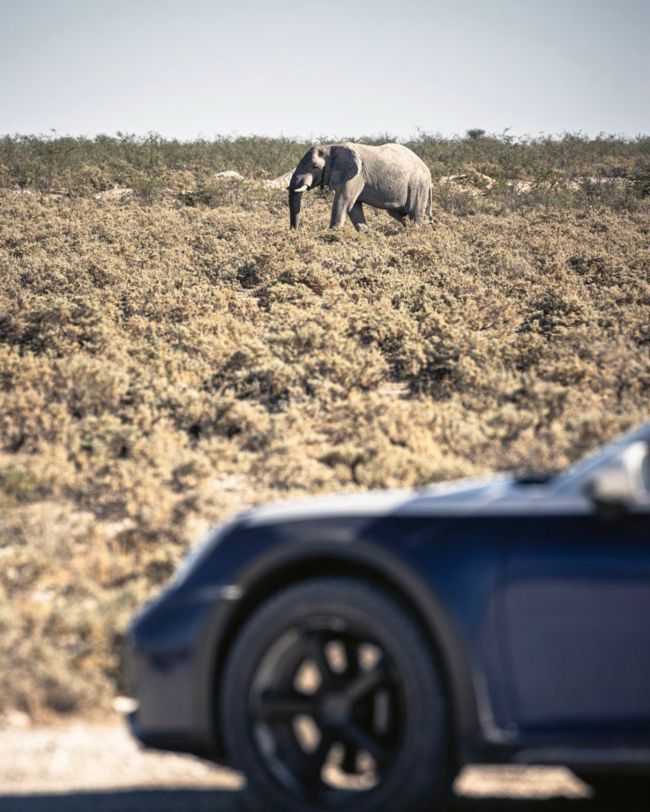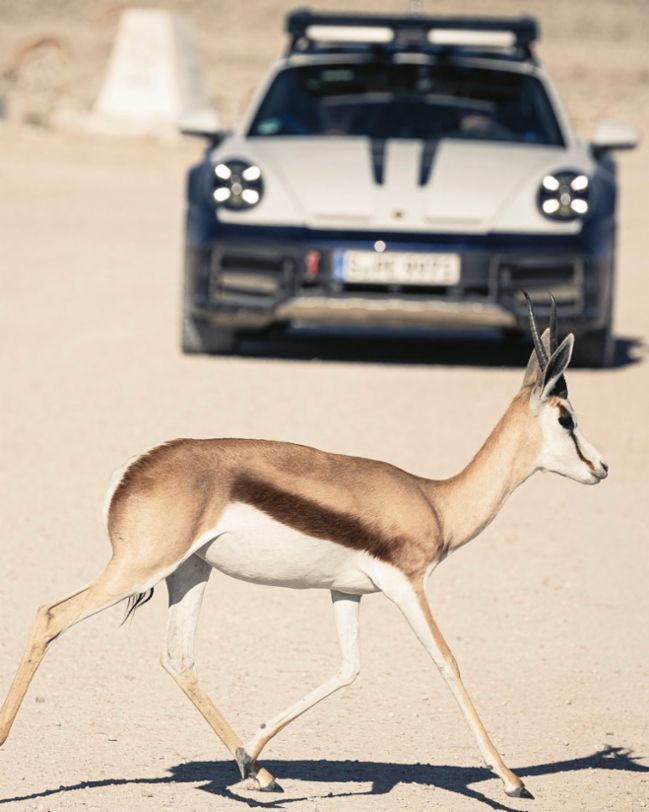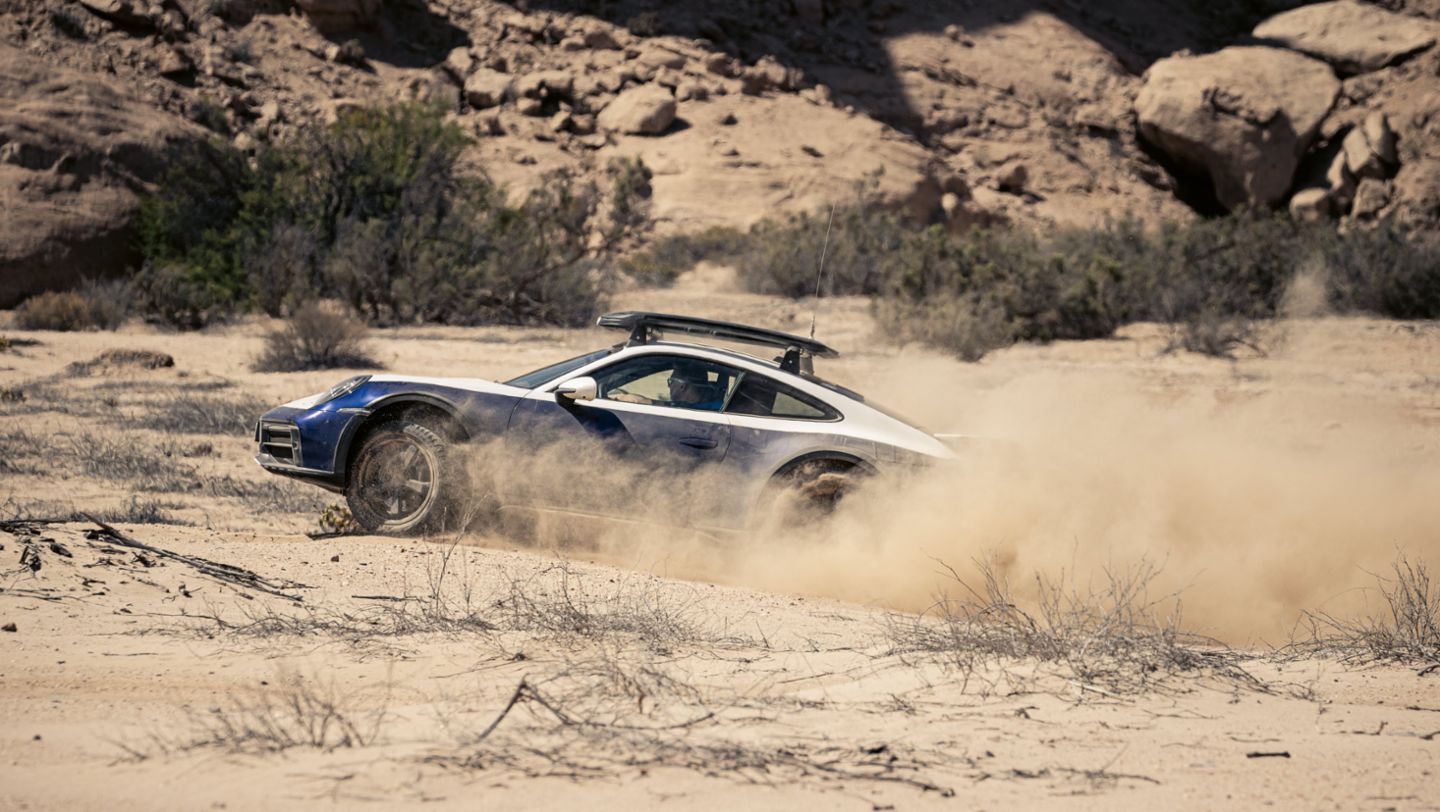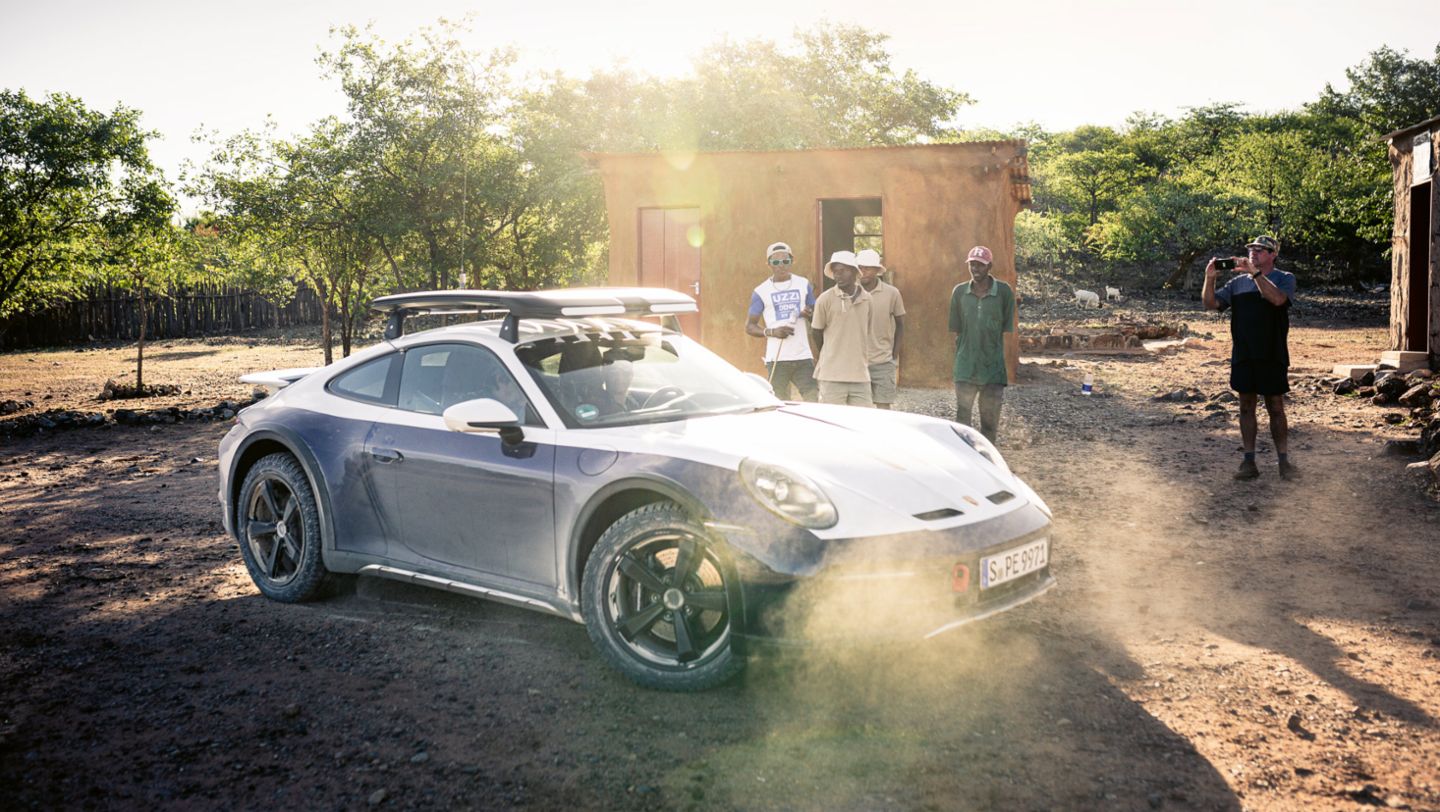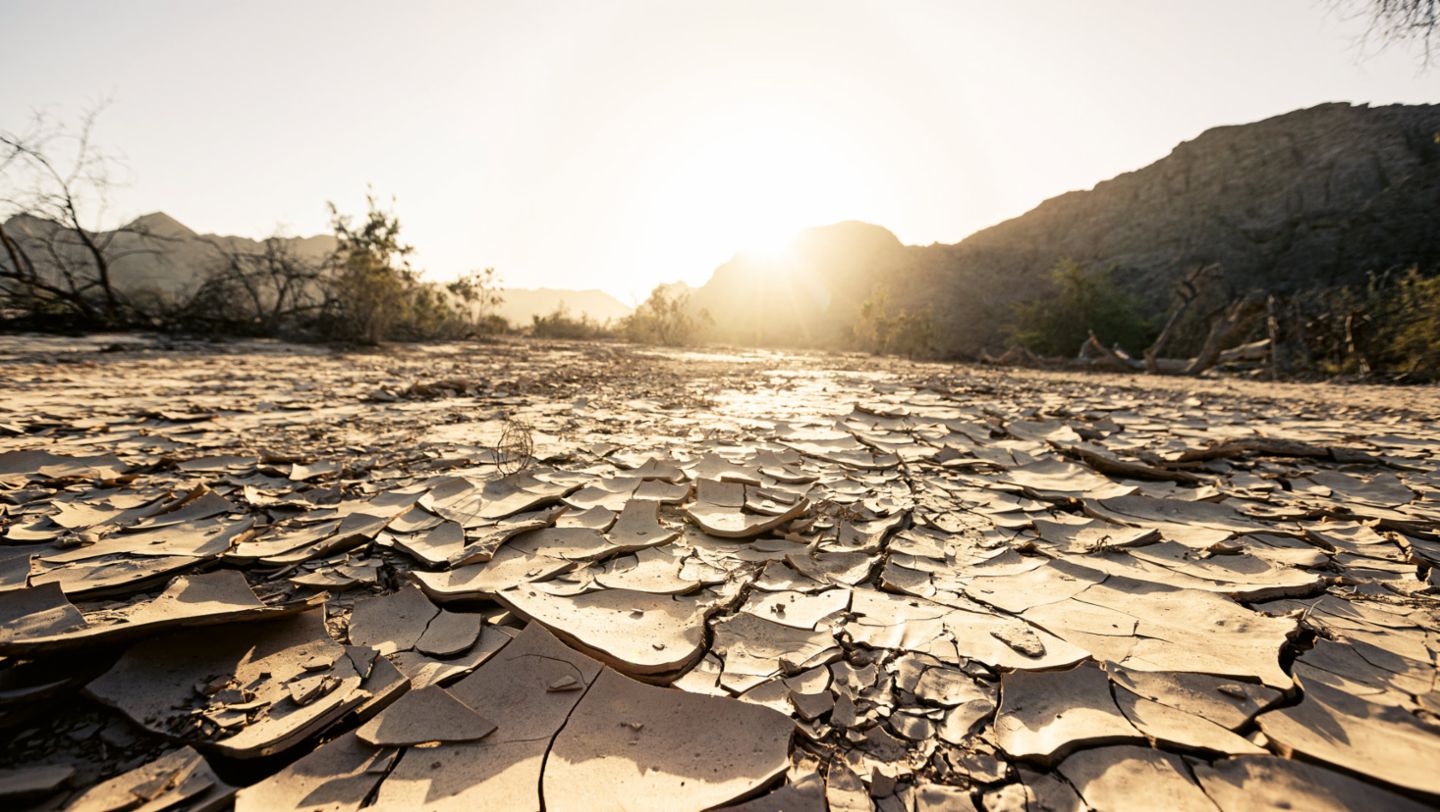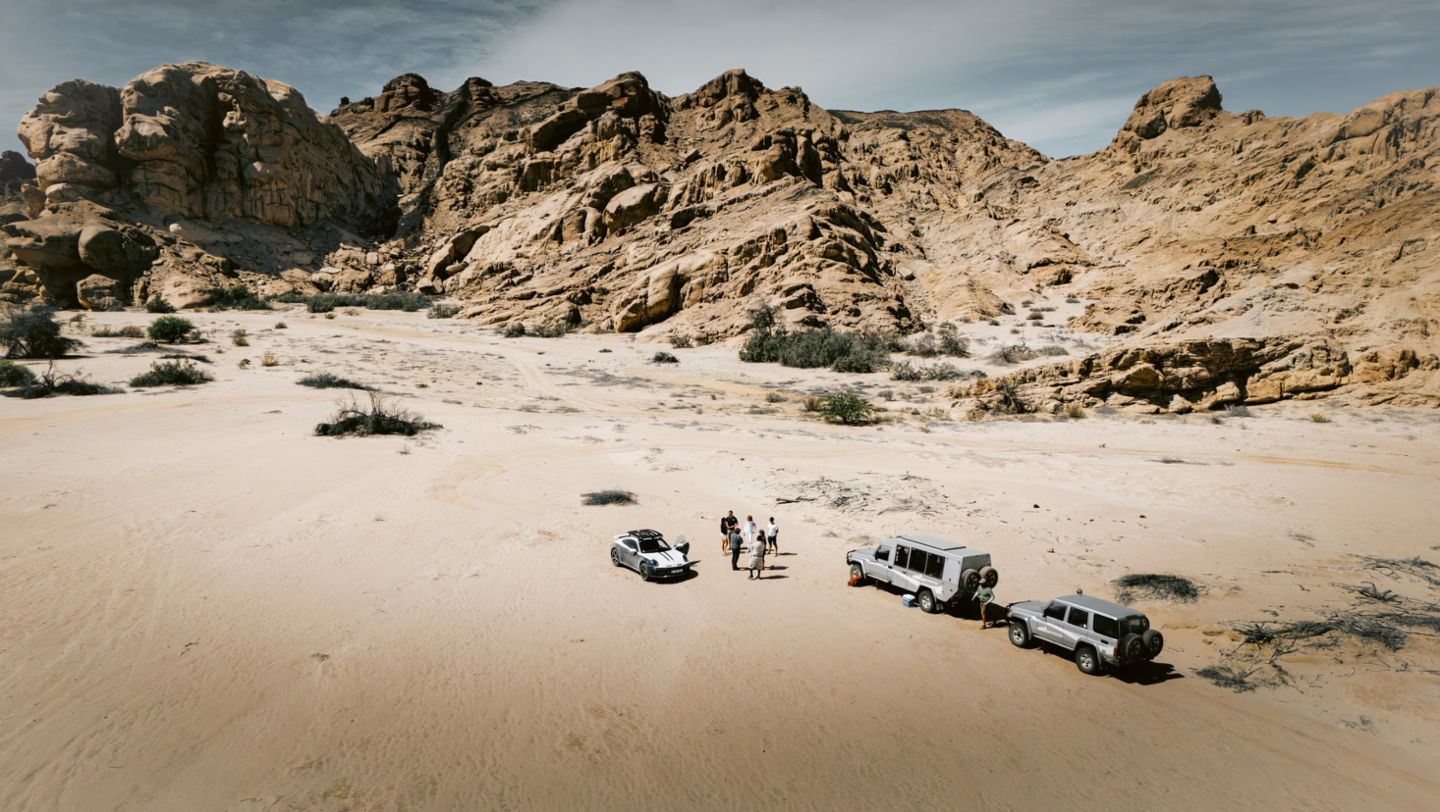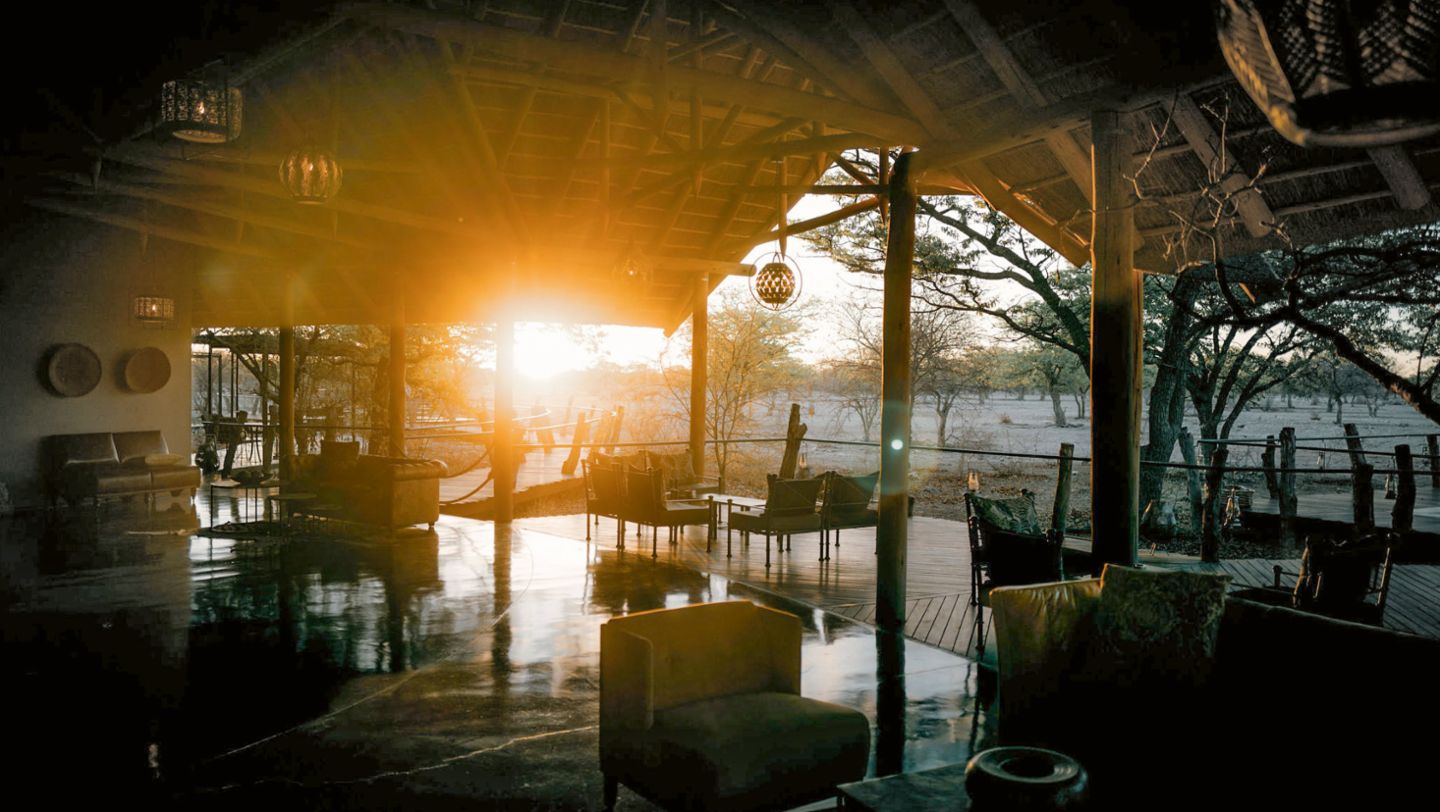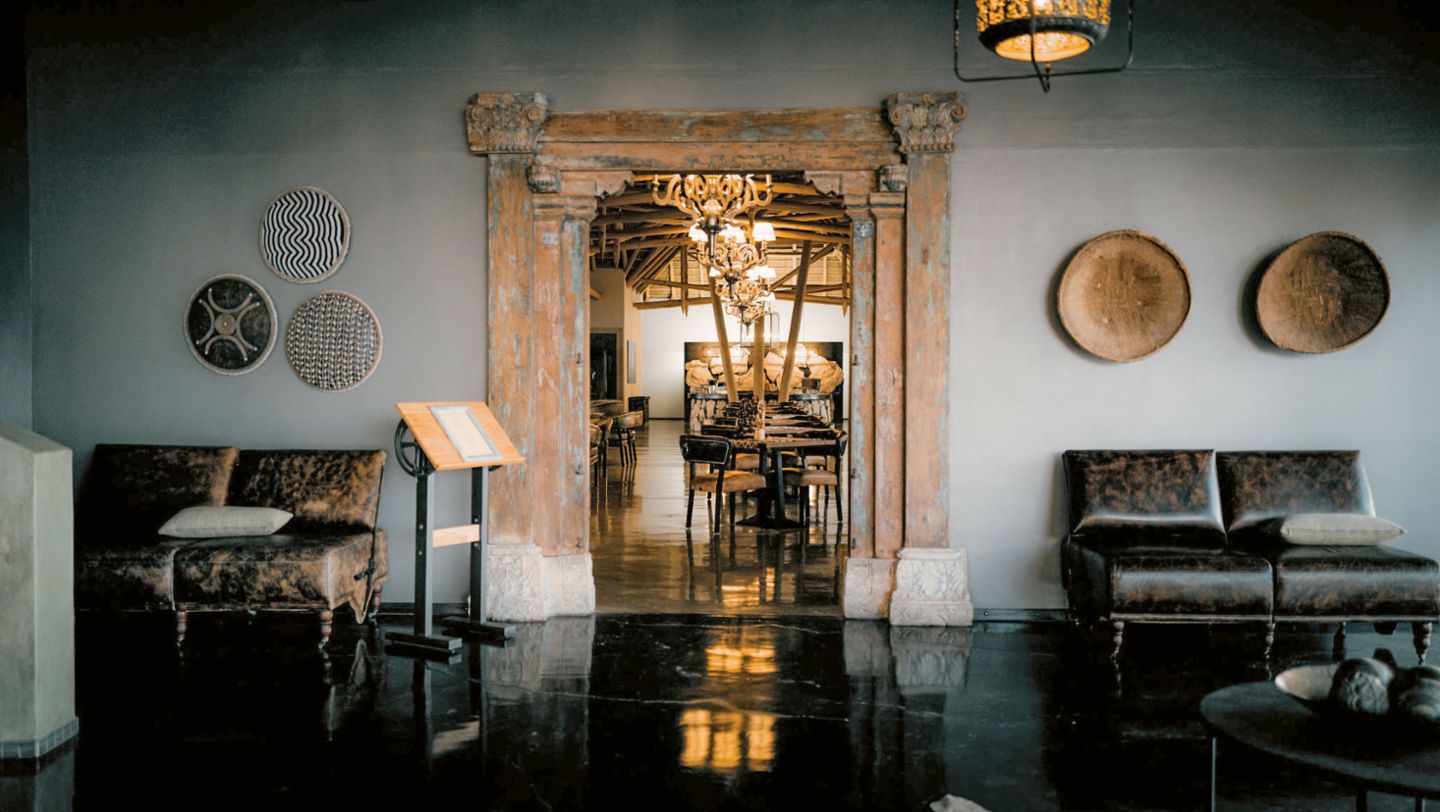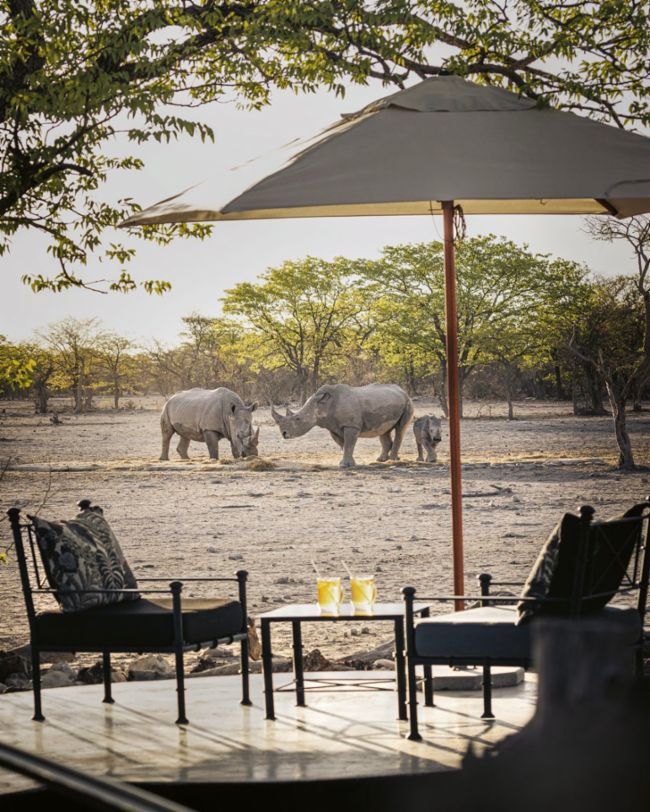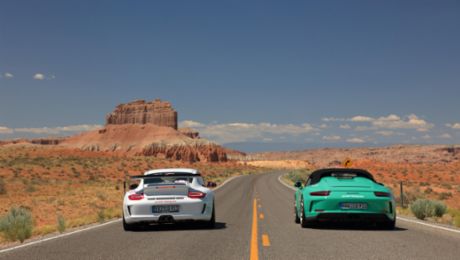Just outside the dreamy coastal town of Swakopmund, the beach is thirty, perhaps forty meters wide at low tide. The ice-cold waves of the Atlantic roll in from the west. To the east, deserts, dunes and mountains stretch deep into the inland — a vast, untouched and hot land. But if you wanted to, you could continue straight along this narrow band of sand toward the north, up to the border with Angola — more than 700 kilometers. Or 800 kilometers south toward the South African border. Endless. Wild. Vast.
In order to perfectly prepare a Porsche Travel Experience in Namibia, it is necessary to adjust your usual frame of reference to the immense proportions of this country — while at the same time paying close attention to even the smallest details. Nine months before the first guests of the Porsche Travel Experience Camp 911 Namibia experience this unusual country in their off-road 911s in September 2024, we are already on the road with a small groundwork team to iron out the final details and address the truly important questions.
Which challenges will the guests will be able to tackle
For Swen, who primarily works as a Senior Instructor at the Porsche Track Experience and is also a racing driver in long-distance motor racing, today is all about testing which challenges the Porsche Travel Experience guests will be able to tackle in the 911 Dakar.
Which routes can the vehicle handle, when, in just a few months, the first convoys with up to eight guest vehicles will traverse this terrain? What tire pressure is needed for an ideal spin on the beach? The sand is coarse and is providing great traction today. Smooth, damp, hard as a board for a change. And just a few meters further along, it is deceptively soft like quicksand, swallowing everything that comes to a halt. Play, now! This outing can only be undertaken during low tide. Otherwise, there is a risk of sinking so deeply in the first few meters that the only option left is to use the towing hook before the tide returns. What does that mean for the daily schedule in nine months time? When will we even be able to drive on the beach then? Will we come here straight after breakfast from our camp, set up in the middle of the moonscape? Or only after we have taken the morning to discover the trails and breathtaking views of this ancient rocky landscape further inland with the 911 Dakar? Whatever the case, this stage on the beach will certainly be a very special one among the many moments filled with adrenaline and freedom during the tour.
The gravel roads make serious demands on tires
Nils, our technician, will also be there. His major question here on the beach is what logistics will be necessary to lower the tire pressure for all eight guest vehicles as much as needed in as short a time as possible. And after the wild ride, to get the pressure back up as quickly as possible, so everyone can continue driving safely on the gravel road. Those responsible make a note: a mobile compressor needs to be available at the exact point where all the vehicles get back on the road after the trip to the beach. And there is also the question of tires. There is virtually no local off-road vehicle here with fewer than two spare tires. The gravel roads, which make up a large part of the Namibian road network, make serious demands on tires. For that reason, the decision to put an additional spare tire on the roof rack of every 911 Dakar was a quick one.
By the time we reach the gravel road heading north, one thing becames abundantly clear. Although Camp 911 Namibia is a typical Porsche Travel Experience, it will be unlike anything that has ever been seen before in this segment. Most other trips in Namibia use comfortable SUVs — like with the Porsche Travel Experience Namibia. Here, guests will be traveling with Cayenne models, digging through the red dunes of Sossusvlei. Or even taking a private plane for the long journey to the Caprivi region in the far northeast of the country and to the world-famous Victoria Falls in the four-border region of Namibia, Botswana, Zimbabwe and Zambia.
“Kilometer-long plumes of dust on the gravel roads make convoy driving as we know it impossible in Namibia.”
At Camp 911 Namibia, the first Porsche Travel Experience with the 911 Dakar, the focus will be on driving — a large part of the route will be on gravel roads and loose terrain. In the bone-dry expanse of Namibia, this primarily means dust. Lots of dust. For the technicians, that means regularly checking the engine air filters, which can sometimes become clogged with the abundance of dust. But the dust also means that line-of-sight convoy driving, as is the case with other Porsche Travel Experiences, will not generally be possible at Camp 911 Namibia. The team has decided to significantly increase the distance between the individual vehicles. And instead, to provide even more-precise instructions about the route via radio, meaning that no one will have to travel through the dust clouds made by the vehicle ahead and that everyone will still be able to find the route safely. This necessary change also turned the original schedule of daily stages on its head.
And all of a sudden everyone realizes that we are in Africa. The fascination of this continent also lies in the fact that surprises are part of everyday life. In other words, one special feature of a trip like this will also be the ability to spontaneously adapt a good plan if the circumstances so require. And to embrace the experiences that may unexpectedly await you for that very reason.
Trusting your experience and instincts
This is nothing unusual for Melanie. She has been traveling around the world as a tour guide for the Porsche Travel Experience for more than ten years. She has a collection of stamps from over 90 countries in her passport and knows Namibia like the back of her hand. She is well aware that it could be 200 kilometers to the next gas station. The people here also help each other out and no one would drive past a broken-down car without first making sure that everything is okay. And even away from the official roads, when maps and GPS are no longer able to show the route — in that case, it is a matter of trusting your experience and instincts, and reading the terrain in front of you meter by meter.
Matthew, our local guide, is from the Owambo tribe. He grew up here and has crossed the rocky passages of the dry river valleys dozens of times. He is able to find ways through places that for us would otherwise have seemed like the end of the road. With his experience, he constantly finds new passages in the rocky gorges and sometimes even follows the tracks of a wild animal in search of the best route. Thanks to the huge ground clearance of his off-road vehicle, the differential locks and the relentless torque of its V8 engine, he can sometimes just power straight through. With the 911 Dakar, greater foresight and a more thoughtful approach to obstacles will be required — before it can again fully unfold its addictive potential while drifting across the next sandy stretch. It is incredible to see what the 911 Dakar is capable of doing when moved skillfully in this environment. This is also why there will be intensive briefings for the drivers during Camp 911 Namibia, so they can fully utilize their skills and the potential of their vehicles, and master these types of situations with confidence.

Despite the barrenness that shapes the first impression of Namibia, the landscape is full of magnificent surprises — you just have to be able to spot them. Or have it explained to you by local specialists. Purreu-Jacques, known to everyone only as “PJ”, is the member of our exploration team responsible for ensuring that Porsche Travel Experience guests get to enjoy plenty of surprises in addition to the lunar landscapes, dusty roads and challenging sand passages. His knowledge knows no bounds. Once he surprised us with a plant whose sap is said to be an excellent remedy for the sunburns that are so easy to get here. He explained how you can survive in the desert for days without water in an emergency. He skillfully removed the stinger from a scorpion and placed it on a forearm. He transformed a small gecko into an extravagant earring before it quickly sought refuge under the nearest rock. And of course he was the first to discover the two lionesses with their cubs in the Etosha National Park, feasting on a recent zebra kill in the shade of a tree.
After days of navigating dusty gravel roads and confronting challenging driving routes, it is the wild animals moving across the endless expanses of the Etosha National Park — and unimpressed by our small convoy — that are the final highlight of the trip. When giraffes, herds of zebras, and springboks cross the road right in front of the windshield of our 911 Dakar, when gray desert elephants capture our attention, or when rhinos start quarreling at the waterhole in front of our lodge, just a few meters away from us and our sundowners, it becomes crystal clear that there is hardly a more fitting place in the world to experience the 911 Dakar in its natural habitat. Welcome to the Namibia adventure.
Info
Text first published in the Porsche magazine STORIES.
Author: Berthold Dörrich
Photos: Moritz Attenberger, Berthold Dörrich
Copyright: All images, videos and audio files published in this article are subject to copyright. Reproduction in whole or in part is not permitted without the written consent of Dr. Ing. h.c. F. Porsche AG. Please contact newsroom@porsche.com for further information.
